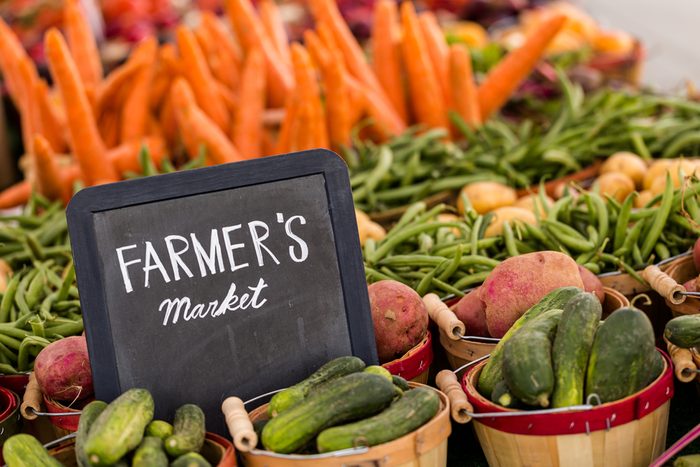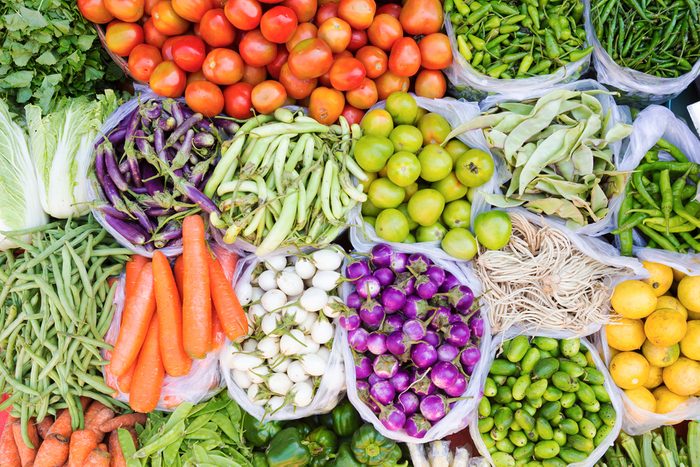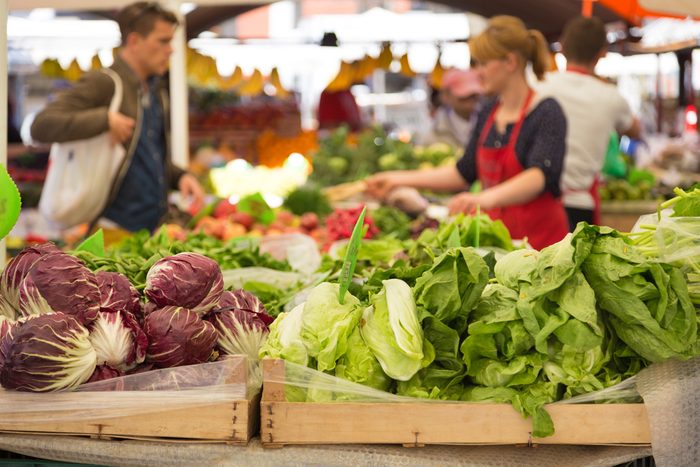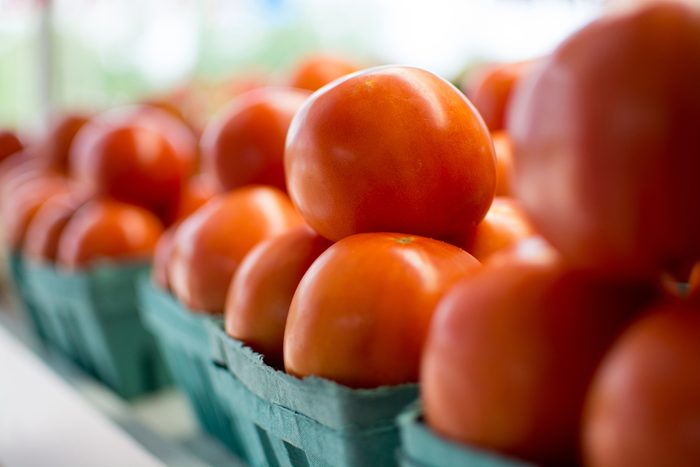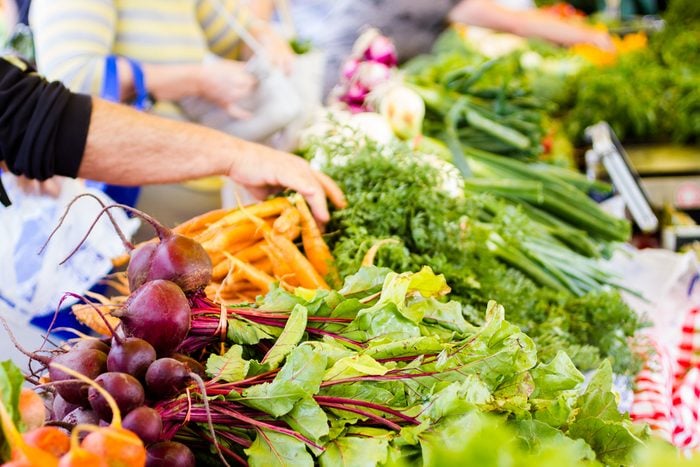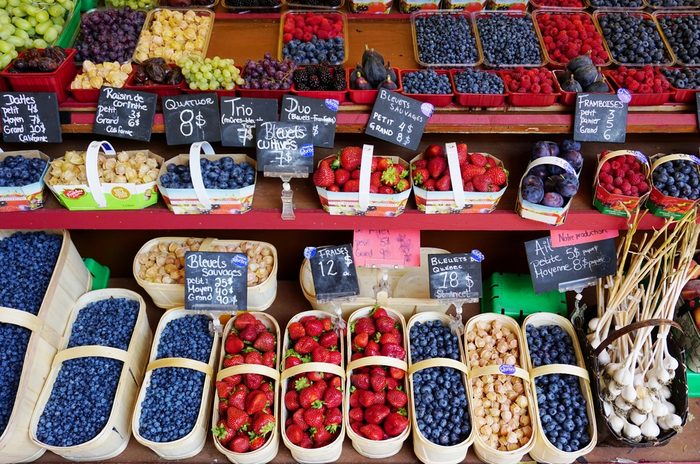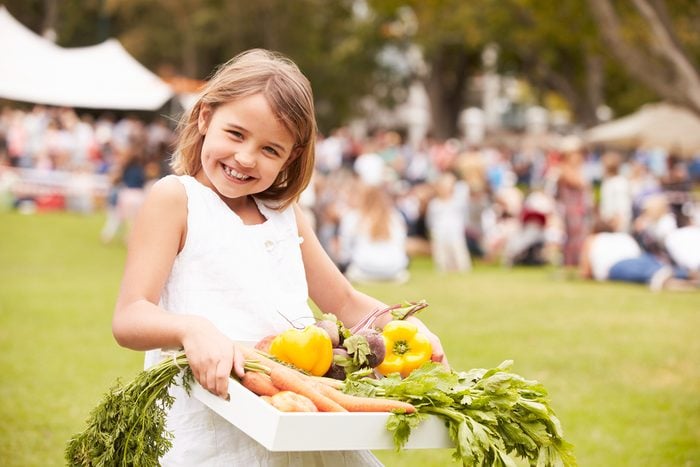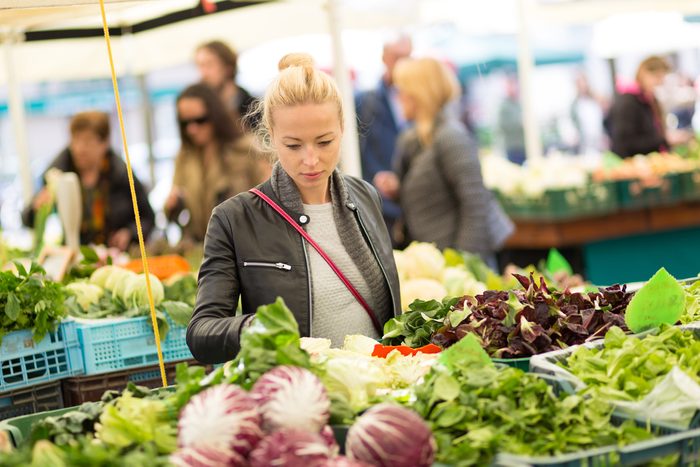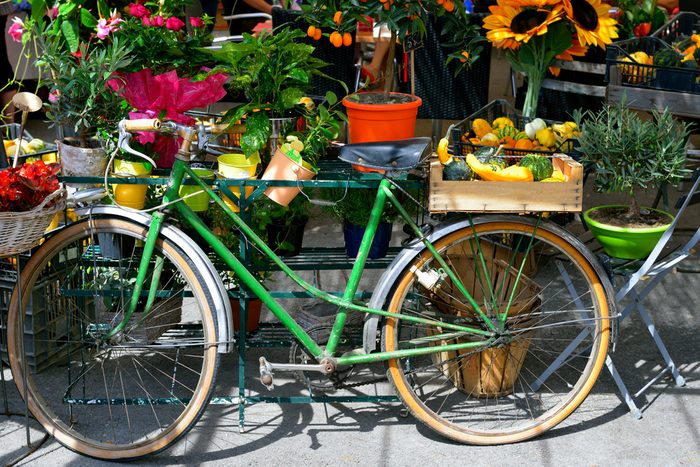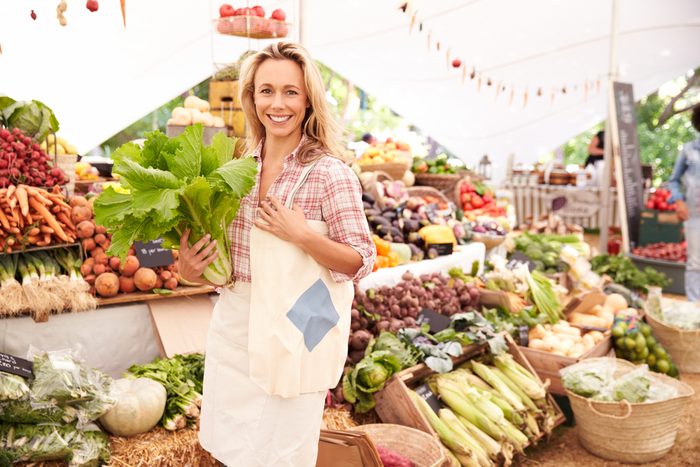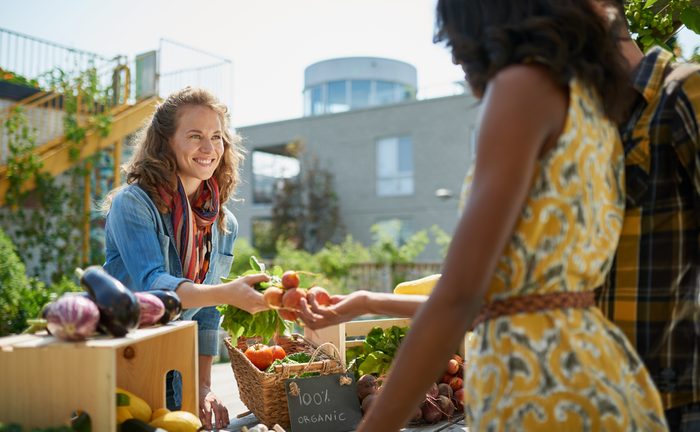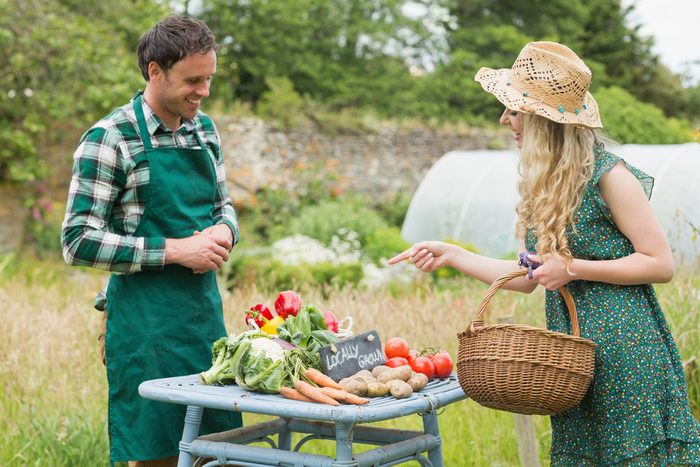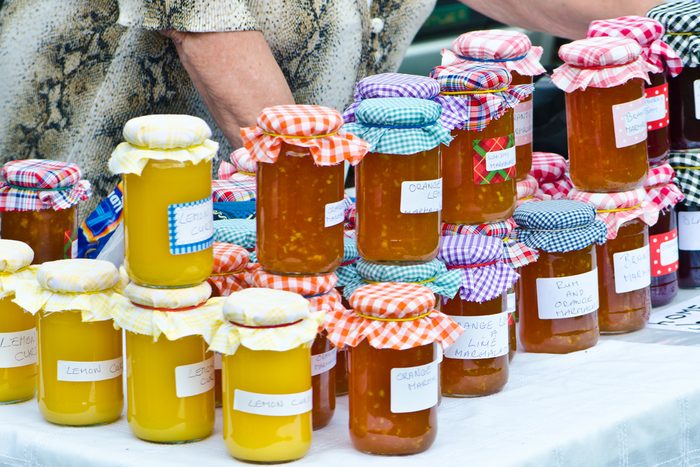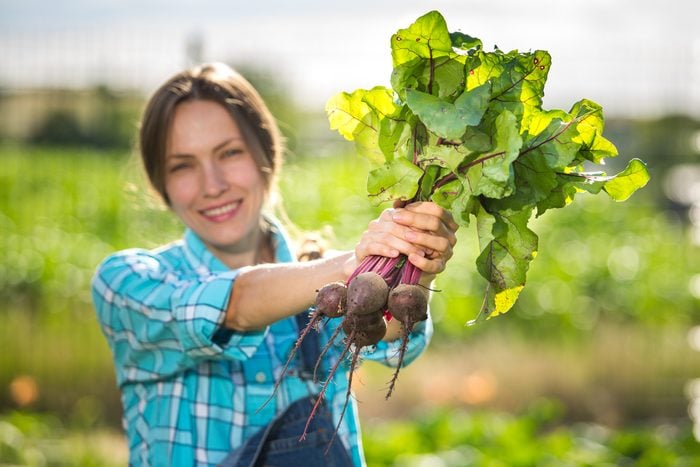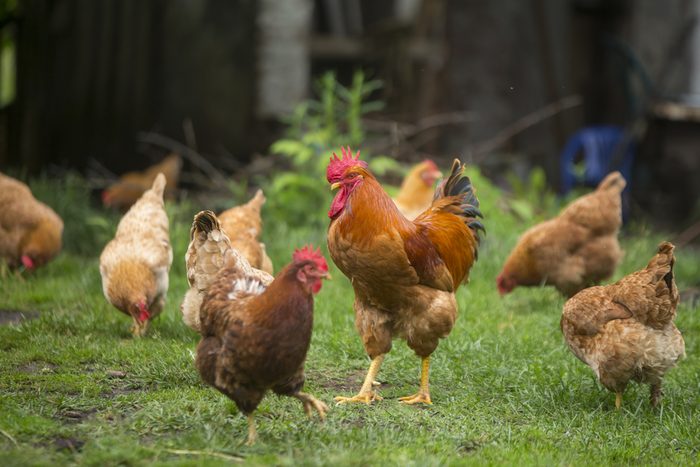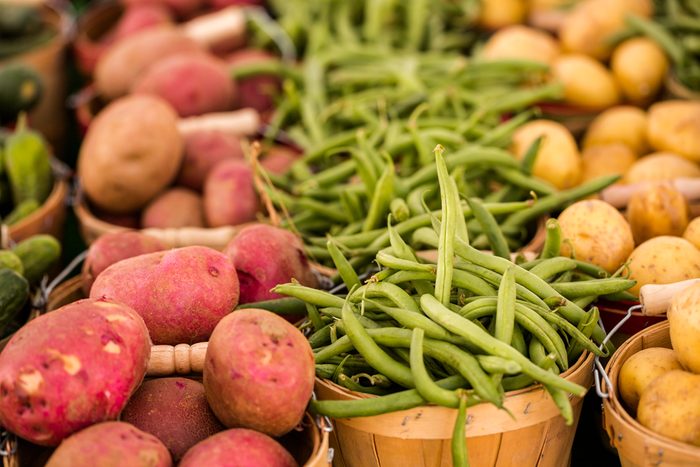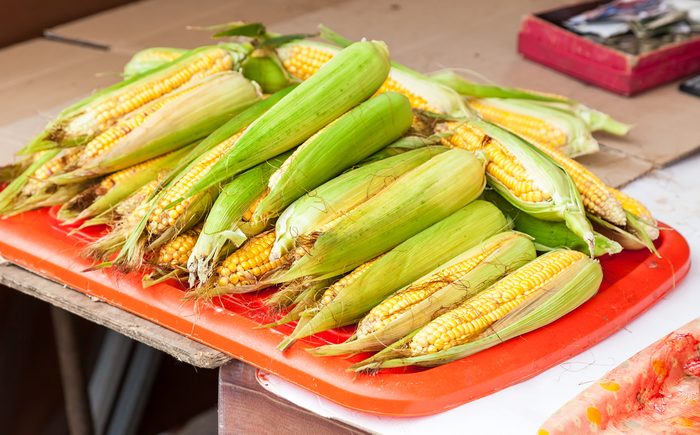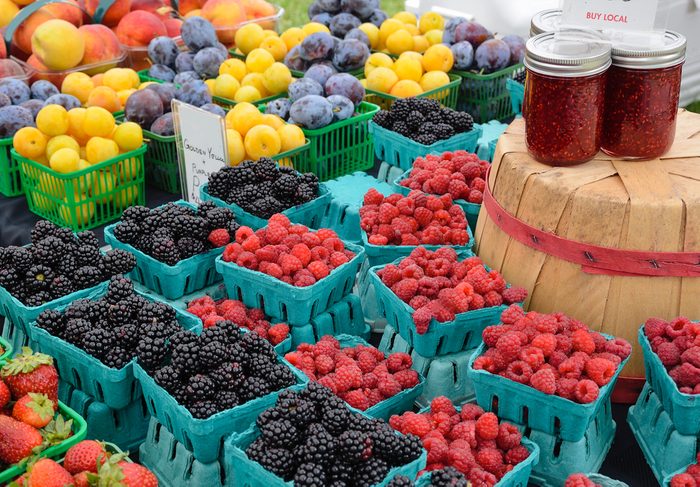1. You’ll save money
Yes, you might spend more initially, but the produce you buy at a farmers’ market will also last you a lot longer. Marina Queirola, Food Manager at Evergreen Brickworks, says produce at the supermarket has already been sitting in transport for at least a day or two, while produce at your local market was most likely harvested earlier that day.
2. You’ll have access to more organic produce
Vendors at farmers’ markets are selected based on a variety of factors, but two of them are their location and whether they’re ecological or certified organic. Usually, they’ll meet at least one of those standards, meaning you’ll have access to more organic foods at a more reasonable price.
3. You won’t have to worry about GMO
Most markets have a say in which vendors they allow in, and often, they’re the ones who produce their goods in a manner the market is proud of. This means less GMO, and more humanely- and naturally-raised livestock and produce.
4. Your produce will be perfectly ripe
Because your produce isn’t travelling far, farmers can harvest exactly what’s ready for consumption, without having to factor in travel time. That means the tomato you’re buying today was selected because it was perfectly ripe and ready to enjoy.
5. Your produce will be more nutritious
There’s nothing artificial about food grown on a small family farm. It hasn’t been gassed to ripen, or been modified to travel well. Many also believe that fresh-from-the-farm produce offer added antioxidants and phytonutrients.
6. Your produce will be more flavourful
When produce has to travel, that becomes the main concern for its producers. When you shop at a farmers’ market, the only thing the producers are concerned about is quality.
7. You’ll have access to food with far fewer-if not, no-chemical preservatives
Shopping at a farmers’ market means you can ask the producers how their crops are raised, what chemicals are used (if any) and when the item was harvested. Because the timeline is much shorter than importing, local farmers don’t have the same need for chemical preservatives.
8. You’ll have more options
Some produce just doesn’t travel well, so supermarkets won’t buy it from farmers in other regions. Hard-to-find products (like green garlic and red carrots) can often only be found at your local market sold by local producers.
9. You’re reducing your carbon footprint
According to Farmers’ Markets Ontario, imported produce travels approximately 2,500 km to get to its final destination (your supermarket). Not only that, but produce that is grown locally and sold at a farmers’ market usually has much less packaging than food that’s travelled a great distance.
10. You’re reducing your community’s carbon footprint
Stocking store shelves with imported products takes a huge toll on the environment. By shopping local, you’re eliminating a lot of that waste and pollution, as well as encouraging the cultivation of the land in your region.
11. You’re supporting your neighbourhood
According to Queirola, one of the largest benefits of farmers’ markets is the opportunity they provide to entrepreneurs. A city with a lot of entrepreneurship also has a lot of innovation; these entrepreneurs are building and diversifying the economy.
12. You’re supporting your country’s economy
Every penny spent at farmers’ markets goes back into the economy in some way; Queirola explains that the farmers’ market at Evergreen Brickworks alone injects $5 million into Canada’s economy every year.
13. You can learn preparation and storage tips from the experts
Having access to food producers is a benefit that most shoppers don’t take full advantage of. Not only are you able to ask specific questions about production, but you can also ask how to prepare and store your food to make sure that it lasts as long as possible, and how to make sure you’re getting the most usage out of your purchase.
15. You can spend more time outdoors
Who wants to spend their weekend inside on a beautiful summer day? Since most farmers’ markets take place outside, doing your shopping here allows you to enjoy the short warm season and make the most of your free time.
16. You can make requests-and provide feedback
If you’re not happy with something you purchased, or are looking for tomatoes that are a little bigger, juicier or even greener, you can ask for it. Especially if you become a regular shopper, producers will get to know you and will often be happy to fulfill special requests.
17. You’re supporting the humane treatment of animals
Do you know where the meat you buy at a supermarket comes from or how it’s raised? Probably not, and it’s close to impossible to get an answer. Queirola suggests asking farmers if they’ve given their livestock antibiotics and if they’ve lived a healthy life with access to the outdoors. You’ll be able to get a straight answer (and often because they’re small farms, it’ll be an answer you’re happy with).
18. You’ll be eating only in-season produce
One of the most expensive types of produce to purchase is produce that isn’t in season in your region. Queirola’s tip: Change your eating habits to eat only what is in season, because that’s how you’ll cut your grocery costs. If you’re at a market and strawberries are just coming out, you’ll probably get a deal on strawberries because farmers want to get rid of them.
19. You’re protecting your family
If something catastrophic happened, and Toronto had to close its import business, the city would only have enough food to survive for three days. In the past, Canadian cities were able to sustain themselves, and it’s important that we do our best to make that possible again.
20. You’re protecting the Earth
Sixty percent of farmers are over 60 years old, and only one in six is coming back to farming. In order to continue to cultivate the land, and maintain the levels of top soil we need to grow crops, Canadians need to support local farmers-and the best way to do that is by shopping at your community’s farmers’ market.
Related:
• 5 Must-Visit Farmers’ Markets in Canada
• 22 Cancer-Fighting Foods You Should Eat Often
• 10 Surprising Ways to Use Cauliflower in Recipes
